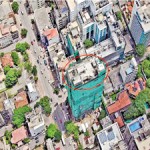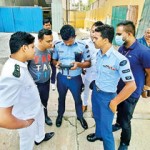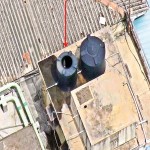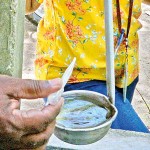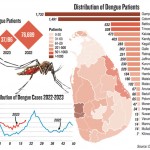News
Multiplying dengue mosquito larvae raises risks for Colombo
View(s):- Drones to check high-rise buildings
By Nathara Abeywickrama
Dengue mosquito larvae have been multiplying in the Colombo District compared with previous years, surveys have shown, and health officials expect a rapid surge in dengue fever in June and July.
An egg can develop into an adult mosquito (Aedes aegypti and Aedes albopictus) in about 7-10 days. Their eggs can survive dry conditions in containers such as discarded tyres, for up to 8 months.
Stagnant water in construction sites, residences and even schools have been identified as mosquito breeding sites.
The Western Provincial Council and the Sri Lanka Air Force in a joint operation used drones to spray larvicides on hard-to-reach areas of Government and non-Government buildings in Battaramulla where there is a high risk of dengue mosquito breeding.
So far this year, 36,914 patients of dengue and 23 deaths have been reported. The highest number of patients, 18,265, is from the Western Province.
- Air Force personnel join PHIs in using drones to detect dengue breeding sites in hard to access places such as high-rise building tops, and water tanks
“In the Western Province the highest number of patients has been found in Gampaha district — 8,302. There are 7,717 dengue cases in Colombo District and 2,246 from Kalutara District,” said Dr. Nimalka Pannilahetti of the Health Ministry’s Dengue Control Unit.
“Also, 1,494 dengue cases have been uncovered from Trincomalee District, 1,554 from Batticaloa District and 2,517 from Puttalam District.’’
The Health Department said a significant number has been reported from Kandy, Ratnapura and Galle districts.
Of the 355 medical officers of health divisions across the country, 61 have been identified as high-risk, while 14 high-risk divisions have been identified in Colombo District.
Dr. Nalin Ariyarathna, director of National Dengue Control Unit told The Sunday Times that at a discussion in Temple Trees, governors exchanged views on the measures so far “to steer the disease and its headway’’.
They pointed out that dengue mosquitoes are likely to breed around construction sites, schools and places of religious significance. “Continuous greater focus will be directed to keep these places clean with the contribution of health and security sectors.”
On every Friday, from May 26, each Government institution should set aside two hours for dengue control.
Health authorities are calling on residents, especially those living in dengue cluster areas to keep the surroundings of their dwellings clean and clear of stagnant water. They should also pay attention to workplaces and public areas.
Dengue fever, also known as break-bone fever, surfaces periodically in Sri Lanka coinciding with the rains, with two peaks in June-July and October-December.
Infections have been recorded in almost all districts.
Colombo, Gampaha and Kalutara districts in the Western Province have produced the highest rate of infections particularly every year.
The main symptoms include high fever, severe headache, severe pain behind the eyes, joint pain, muscle and bone pain, rash and mild bleeding usually around nose or gums.
If symptoms persist, a person should seek immediate medical care.
Doctors say only paracetamol should be taken to control fever and relieve pain.
“Dengue is an infectious disease that can potentially exceed the hospital’s capacity to provide healthcare services notably with the persisting drug shortage. A rapid rise in the number of the patients indicates an early warning for a dengue outbreak as in 2017 where 180,000 cases were disclosed. In the absence of an effective vaccine that protects humans from dengue, putting an end to the probability of continuous breeding of mosquitoes is the most effective way to prevent infections,” Dr. Chamil Wijesinghe, media secretary of the Government Medical Officers’ Association (GMOA), said.
Likewise, environmental management approaches involve eliminating the container habitats in which the Aedes aegypti mosquito lay their eggs. Chemical control involves the use of insecticides against immature or adult mosquitoes.
The best way to say that you found the home of your dreams is by finding it on Hitad.lk. We have listings for apartments for sale or rent in Sri Lanka, no matter what locale you're looking for! Whether you live in Colombo, Galle, Kandy, Matara, Jaffna and more - we've got them all!


